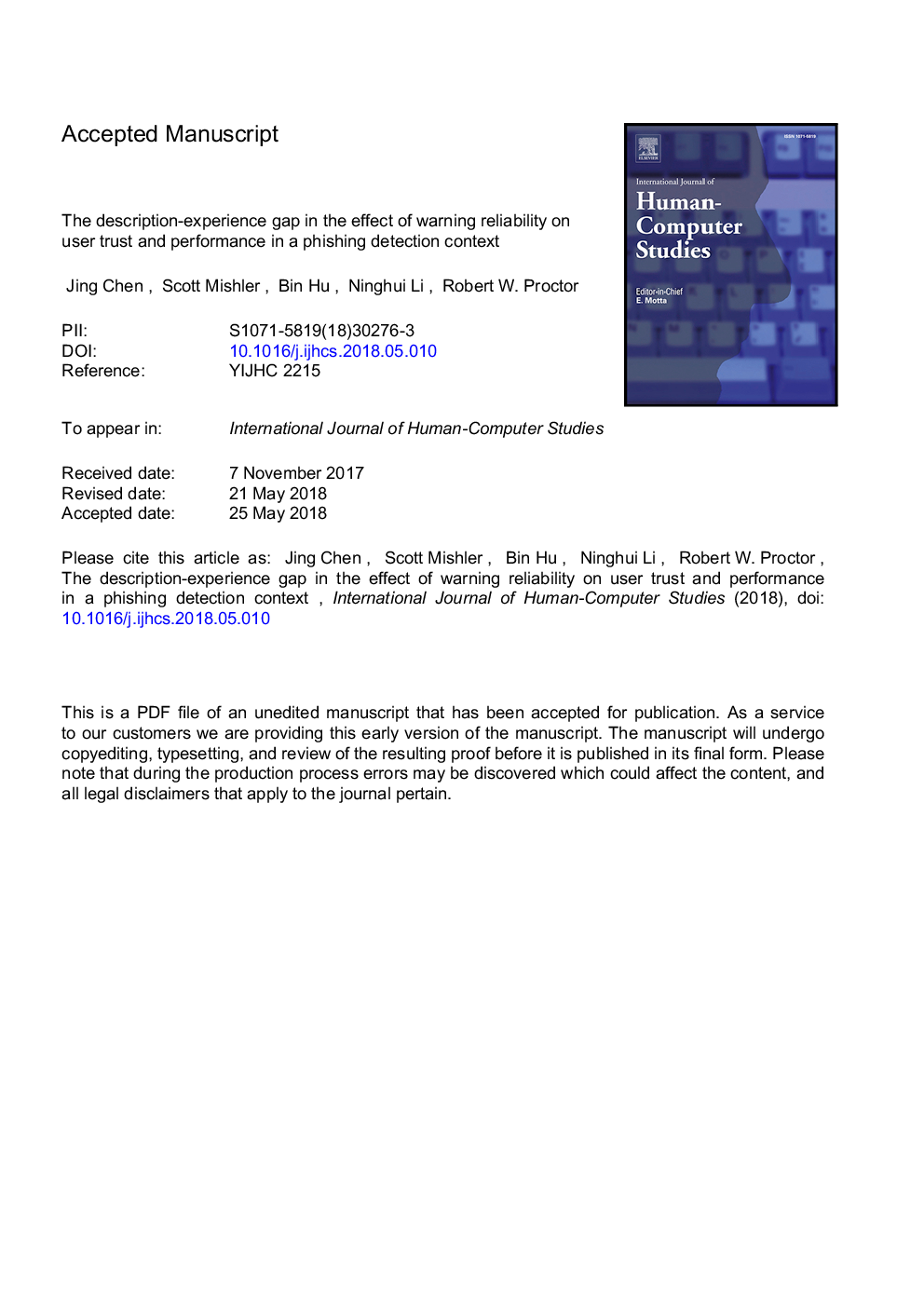| کد مقاله | کد نشریه | سال انتشار | مقاله انگلیسی | نسخه تمام متن |
|---|---|---|---|---|
| 6860934 | 1438935 | 2018 | 44 صفحه PDF | دانلود رایگان |
عنوان انگلیسی مقاله ISI
The description-experience gap in the effect of warning reliability on user trust and performance in a phishing-detection context
ترجمه فارسی عنوان
شکاف توصیف تجربه در تأثیر قابلیت اطمینان در مورد اعتماد و عملکرد کاربر در یک زمینه تشخیص فیشینگ
دانلود مقاله + سفارش ترجمه
دانلود مقاله ISI انگلیسی
رایگان برای ایرانیان
کلمات کلیدی
شکاف توصیف و تجربه، اعتماد، تعامل انسان و اتوماسیون، تشخیص فیشینگ، بازخورد،
ترجمه چکیده
چگونه کاربر انسانی با یک سیستم اتوماسیون اداری اعتماد می کند و تحت تاثیر قرار می گیرد که چگونه توانایی های سیستم به کاربر منتقل می شود. هنگامی که با سیستم اتوماسیون ارتباط برقرار می کنید، کاربر می تواند اطلاعات قابلیت اطمینان سیستم را از طریق یک توضیح صریح از قابلیت اطمینان یا از طریق تجربه سیستم در طول زمان بدست آورد. شکاف توصیفی-تجربه، تفاوت بین تصمیمات انسانی مبتنی بر توصیف و مبتنی بر تجربه را نشان می دهد. در مطالعه حاضر، ما بررسی کردیم که چطور این شکاف توصیفی-تجربه در تعامل با اتوماسیون انسانی با یک وظیفه شناسایی فیشینگ در حوزه سایبر است. در دو آزمایش، عملکرد شرکت کنندگان در شناسایی ایمیل های فیشینگ و اعتماد آنها به سیستم شناسایی فیشینگ، هنگامی که قابلیت اطمینان، توصیف و تجربه (یعنی بازخورد) سیستم، به طور سیستماتیک در کارهای تشخیص آسان و دشوار فیشینگ، تغییر یافت. نتایج نشان داد که قابلیت اطمینان سیستم تأثیر عمیقی بر عملکرد انسان در سیستم دارد، اما مزایای استفاده از یک سیستم قابل اعتماد ممکن است به مشکل کاری بستگی داشته باشد. همچنین ارائه بازخورد، کالیبراسیون اعتماد را با توجه به اهداف مورد نظر و اعتماد ذهنی تقویت می کند، در حالیکه توصیف قابلیت اطمینان سیستم فقط اعتماد ذهنی را افزایش می دهد. این الگو نتیجه نه تنها شکاف در تأثیرات بازخورد و توصیف را نشان می دهد، بلکه مفهوم شکاف توصیف تجربه را از حوادث نادر به رویدادهای معمول گسترش می دهد.
موضوعات مرتبط
مهندسی و علوم پایه
مهندسی کامپیوتر
هوش مصنوعی
چکیده انگلیسی
How the human user trusts and interacts with an automation system is influenced by how well the system capabilities are conveyed to the user. When interacting with the automation system, the user can obtain the system reliability information through an explicit description of the reliability or through experiencing the system over time. The term description-experience gap illustrates the difference between description-based and experience-based human decisions. In the current study, we investigated how this description-experience gap applies to human-automation interaction with a phishing-detection task in the cyber domain. In two experiments, participants' performance in detecting phishing emails and their trust in the phishing detection system were measured when system reliability, description, and experience (i.e., feedback) were varied systematically in easy and difficult phishing detection tasks. The results suggested that system reliability had a profound influence on human performance in the system, but the benefits of having a more reliable system may depend on task difficulty. Also, providing feedback increased trust calibration in terms of both objective and subjective trust measures, yet providing description of system reliability increased only subjective trust. This result pattern not only shows the gap in the effects of feedback and description, but it also extends the description-experience gap concept from rare events to common events.
ناشر
Database: Elsevier - ScienceDirect (ساینس دایرکت)
Journal: International Journal of Human-Computer Studies - Volume 119, November 2018, Pages 35-47
Journal: International Journal of Human-Computer Studies - Volume 119, November 2018, Pages 35-47
نویسندگان
Jing Chen, Scott Mishler, Bin Hu, Ninghui Li, Robert W. Proctor,
